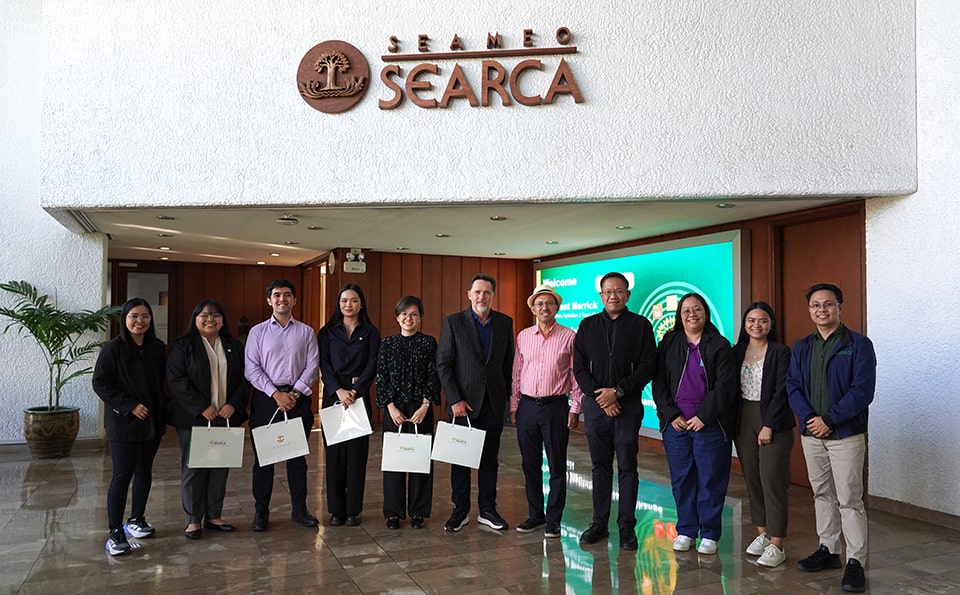A delegation from the Tony Blair Institute for Global Change (TBI) led by Mr. Grant Merrick, senior advisor for agriculture and food, and Ms. Tina Del Rosario, manager of the Asia Pacific Advisory, TBI Philippines, visited the Southeast Asian Regional Center for Graduate Study and Research in Agriculture (SEARCA) on 16 February 2024 to explore possible areas of collaboration, particularly in advancing the agriculture sector, including the promotion of responsive and climate-resilient research and development and innovation.

TBI is a non-profit organization that works with political leaders worldwide and helps governments deliver positive change for their people. TBI Philippines was recently established as part of TBI's growing presence in Southeast Asia, with offices in Indonesia, Singapore, and Vietnam.
During the meeting, SEARCA Center Director Dr. Glenn Gregorio gave the visitors an overview of the Center's mandate, five-year plan, and core programs. He highlighted the SEARCA MS and PhD scholarship offerings and the academic and travel grants programs. He discussed the Seed Fund for Research and Training, a grant that provides starter funds to researchers and scientists who contribute significantly to Southeast Asian agriculture but lack the funding to carry out their projects, and the Regional Professorial Chair Grants, an annual recognition given to outstanding Southeast Asian academic professionals who have made significant and notable contributions to their respective fields.
Dr. Gregorio also introduced the Grants for Research towards Agricultural Innovative Solutions (GRAINS). GRAINS provides starter funds not only to researchers and scientists but also to inventors and entrepreneurs who aim to scale up their technology or innovation model. Ms. Christina Corales, a program specialist from the Emerging Innovation for Growth Department, cited some of these technologies, including the bioplastic films from shrimp waste materials by the University of San Carlos in Cebu, Philippines, and the edible coating that delays the ripening and extending the shelf life of mangoes developed by HS InnoTech, Inc. (HSII). She also mentioned the GRAINS project with SpaceCrop Technologies, an agricultural software company that helps farms manage irrigation and increase crop resiliency using satellite data and artificial intelligence.
Moreover, Dr. Gregorio informed the group of the Food is Life Exemplified Promoting Planetary Health Diet (FLEx PHD) competition, a hackathon that fostered the development of mobile applications that guide consumers in making informed food choices based on their nutritional needs, the food's health benefits, and its production's impact on farmer income and the environment.
On the other hand, Ms. Bernice Anne De Torres, a program specialist from the Research and Thought Leadership Department, underscored SEARCA's roadmap development projects, such as the newly developed Philippine coconut and calamansi industry roadmaps and the Myanmar pulses roadmap. She also revealed to the visitors that the Center is establishing the Consortium for Agricultural Development, Research, and Extension (CADRE), a regional network of high-caliber and like-minded institutions that will collaborate in delivering research and extension support to the most pressing issues and challenges faced by the Southeast Asian agriculture sector.
SEARCA Deputy Director Assoc. Prof. Joselito Florendo presented the Center's capacity-building and institutional development assistance projects, such as the Philippine Commission on Higher Education (CHED)-funded Leveling-up Philippine Higher Education Institutions in Agriculture, Fisheries, and Natural Resources (LevelUPHEI AFAR), which aimed at enhancing the relevance and competitiveness of the country's higher education institutions (HEIs) in the 21st century. He also introduced the Southeast Asian University Consortium for Graduate Education in Agriculture and Natural Resources (UC), a network of esteemed universities in Southeast Asia, Canada, Germany, Japan, and Taiwan.
Furthermore, Dr. Gregorio showcased some of the Center's joint publications, including the Department of Agriculture-Philippine Coconut Authority (DA-PCA) and the SEARCA-formulated National Agriculture and Fishery Modernization and Industrialization Plan (NAFMIP 2021–2030) of the Philippines, a co-publication with the Asian Development Bank (ADB), the Food and Agriculture Organization of the United Nations (FAO), and the SyCip Gorres Velayo Co., and the Technology Transfer and Business Development Manual, a project with the University of the Philippines Los Baños Technology Transfer and Business Development Office.
When asked about carbon neutrality initiatives, Dr. Gregorio cited the Center's capacity-building activity on the use of the Carbon Wise Rice Information Management System, a web-based measurement monitoring, reporting, and verification (MRV) tool that allows farmers to input farm activity data, which are then used to calculate carbon emissions. He also cited the Rice Straw Biogas Hub (RSBH) initiative, which envisioned to generate biogas as clean energy from waste rice straw and provide innovative technology services for rice farmers. Moreover, he mentioned SEARCA and Bangko Sentral ng Pilipinas's (BSP) Roundtable Discussion Series on Sustainable Food and Agriculture Systems in Southeast Asia, which covered sessions on promoting carbon farming in agriculture in Southeast Asia through regional cooperation.
TBI Philippines is currently exploring a number of areas in which it can support the Philippines' development goals, with agriculture and food security as sectors of interest. Acknowledging the expertise and contributions of SEARCA, Ms. Del Rosario said, "We are interested in exploring opportunities to work and collaborate with partners like SEARCA moving forward."
Dr. Gregorio saw a lot of commonalities between SEARCA and TBI Philippines. "TBI Philippines is very young yet very relevant, and we look forward to partnering with you," Dr. Gregorio said.
The visitors were warmly received by Dr. Gregorio; Assoc. Prof. Florendo; Ms. Beatrisa Martinez, executive coordinator, Office of the Director; Ms. De Torres; Ms. Corales; Mr. Sonny Pasiona, a program specialist of the Training for Development Unit-Education and Collective Learning Department; and key Partnerships Unit staff.